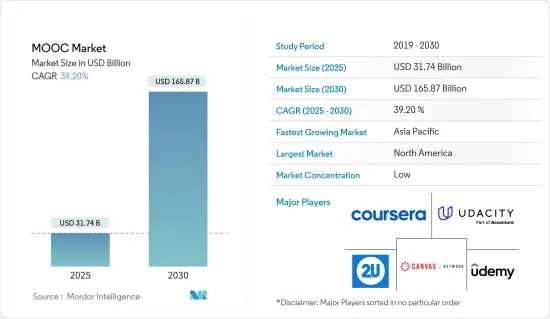
|
시장보고서
상품코드
1641892
MOOC : 시장 점유율 분석, 산업 동향,통계, 성장 예측(2025-2030년)MOOC - Market Share Analysis, Industry Trends & Statistics, Growth Forecasts (2025 - 2030) |
||||||
■ 보고서에 따라 최신 정보로 업데이트하여 보내드립니다. 배송일정은 문의해 주시기 바랍니다.
MOOC 시장 규모는 2025년 317억 4,000만 달러로 추정되며, 예측 기간 중(2025-2030년) CAGR은 39.2%로, 2030년에는 1,658억 7,000만 달러에 달할 것으로 예측됩니다.

주요 하이라이트
- 디지털화의 동향, 스마트폰의 보급 확대, 인터넷의 유연한 접근성에 더해, 비용 효율적인 교육 플랫폼에 대한 수요 증가가 대규모 공개 온라인 강좌 시장 성장을 가속하고 있습니다.
- 정보통신기술의 발전으로 교육자와 학습자는 시간, 공간, 환경의 제약을 넘어 설 필요가 있습니다. 표준 교실에서의 교육이 잘 알려진 학습 시스템인 반면, 교실 밖에서의 교육, 특히 대규모 공개 온라인 강좌(MOOC)와 같은 기술을 통해 개선된 교육은 지난 몇 년동안 큰 성장을 이루고 있습니다.
- MOOC은 저렴한 비용으로 수강 자격이 없기 때문에 지식을 요구하는 사람들 사이에서 상당한 지지를 받고 있습니다. 또한, 이러한 과정은 더 질적인 지식과 전문 지식을 습득하고 그 기회를 높여 사람들의 경력 전환을 지원할 수 있습니다. 이러한 요인이 향후 수년간 시장을 더욱 견인할 것으로 예상됩니다.
- 게다가 디지털 학습으로의 전환은 시장의 성장을 증가시키고 있습니다. 세계의 학생이 온라인 학습에 익숙해지게 되어, MOOC 시장의 요구가 높아지고 있습니다.
- 각국의 정부는 학생들에게 최대한의 이익을 제공하기 위해 대학과 학교에 MOOC의 도입과 보급을 촉구하고 MOOC의 요구를 뒷받침하고 있습니다.
- COVID-19의 대유행 시에는 많은 국가에서 폐쇄되었기 때문에 MOOC 수요가 급증하고 세계 학생들이 디지털 학습 플랫폼을 채택했습니다. 유행 이후 MOOC 가입자 수가 크게 증가하고 있습니다. 예를 들어, 2023년 Coursera는 genAI 컨텐츠를 추구하는 학습자들의 관심이 크게 급증했고, 검색 횟수가 전년 대비 4배로 급증했습니다. 이 수요에 부응하여, 유명한 대학과 산업협력자가 35개 이상의 genAI의 코스와 프로젝트를 전개해, 570,500명이라는 경이적인 수강자를 모았습니다. 이는 일년 내내 Coursera의 genAI 컨텐츠에 1분에 한 명 가까이 등록한 것입니다.
대규모 공개 온라인 강좌 시장 동향
기술 부문이 큰 점유율을 차지할 전망
- 기술 부문은 시장에서 가장 발전하는 부문 중 하나입니다. 수익 창출이 가장 쉽기 때문에 대부분의 사람들이 이 카테고리에 등록합니다. 또한 AI 및 데이터 분석과 같은 최신 기술의 채택이 여러 산업에서 확대되고 있는 것도 예측 기간 동안 같은 부문의 성장을 뒷받침할 것으로 예상됩니다.
- 기술 부문은 주로 컴퓨터 과학 관련 과정으로 구성됩니다. MOOC의 강의는 기업 및 취업 시장에서 사용되는 최신 기술과 소프트웨어를 중심으로 설계되었습니다. MOOC에서는 블록체인, 인공지능(AI), 스마트 시티, 암호화폐, 데이터 과학, 데이터 분석, 통계학, 머신러닝, 사이버 보안 등 신흥 부문의 수강자가 늘고 있습니다.
- 클래스 센트럴에 따르면 현재까지 온라인 강좌의 상위 100개 중에서 기술이 가장 큰 비중을 차지하고 있습니다. 지난 몇 년동안 기술 부문에서 가장 많은 수강자가 많았던 코스는 'Introduction to Interactive Programming in Python'(라이스 대학, Coursera 경유), 'Getting Started with Python'(미시간 대학, Coursera 경유), 'Machine Learning'(스탠포드 대학, Coursera 경유), 'Intro 'Elements of AI'(헬싱키 대학, Independent 경유), 'Divide and Conquer', 'Sorting and Searching', 'Randomized Algorithms'(스탠포드 대학, Coursera 경유) 등이 있습니다.
- 시장 세분화 벤더는 기술 부문에서 확장되는 비즈니스 기회를 얻기 위해 지속적으로 코스를 업그레이드하고 기술을 기반으로 한 새로운 코스를 시작해야합니다.
- 예를 들어, 2024년 5월, 도쿄 테크 아카데미 for Super-Smart Society의 온라인 교육 부서는 초보자를 위한 온디맨드 프로그래밍 강좌의 재시작을 발표했습니다. 제목은 "초보자를 위한 프로그래밍": 이 강좌는 MIT와 하버드 대학이 공동으로 설립한 유명한 MOOC 플랫폼인 edX에서 개최됩니다. 다카하시 아츠시 교수와 공학부의 MATLAB TA가 지도하는 이 코스에서는 참가자가 프로그래밍의 기초를 배웁니다. 특히 사전 프로그래밍이나 장기 지식이 필요없고, 수강자는 MathWorks의 기간 한정 라이선스를 통해 코스의 주요 도구인 MATLAB에 무료로 액세스할 수 있다는 것입니다.
- 게다가 기술 시스템 과목의 필요성이 증가함에 따라 시장 벤더는 기회를 포착하기 위해 새로운 코스를 지속적으로 시작하여 기술 시스템 부문을 견인하고 있습니다.
- 2023년에 CodinGame이 전한 바에 따르면 채용 담당자들 사이에서 가장 요구되는 기술 기술은 웹 개발이었고, DevOps와 데이터베이스 소프트웨어 기술이었습니다. 흥미롭게도 채용 담당자의 16% 이상이 사이버 보안 전문 지식을 가진 후보자를 주요 대상으로 삼았습니다. AI/머신러닝/딥러닝은 응답자의 약 4분의 1이 최우선 사항으로 꼽으며 4위를 확보했습니다. 이러한 추세는 세계 개발자가 선호하는 기술, 특히 웹 개발 및 AI/머신러닝/딥러닝을 반영합니다.
큰 시장 성장이 기대되는 아시아태평양
- 방대한 노동 인구와 취학 인구를 가진 중국은 교육의 공정성, 질 및 효율성을 높이기 위해 디지털 학습 기술을 활용합니다. 또한 정부의 이러한 노력은 중국에서 MOOC의 성장을 더욱 촉진하고 있습니다.
- 인도와 중국과 같은 아시아태평양 국가들은 디지털화, 스마트폰 사용, 인터넷 보급, 온라인 학습자 수 증가로 인해 대규모 공개 온라인 강좌(MOOC)에 대한 수요가 커지고 있습니다.
- MOOC 시장은 인도네시아의 Cyber Education Institute, JMOOC, KMOOC, M-MOOC, XuetangX, ThaiMOOC, 인도의 SWAYAM 등 각국의 MOOC 포털이 설립되어 기능하고 있기 때문에 이 지역에서 기세를 늘리고 있습니다.
- 2024년 2월 인도 정부는 델리에서 'SWAYAM Plus' 플랫폼을 출시했습니다. 이 플랫폼은 L&T, Microsoft, CISCO 등의 산업과 공동으로 개발되었으며 고용 가능성과 전문 기술 향상에 중점을 둡니다. 인도공과대학 마드라스는 MOOC의 중심 플랫폼인 Swayam-NPTEL의 설립기관으로서의 전통을 바탕으로 'SWAYAM Plus'의 운영을 감독할 예정입니다.
- 게다가 이 지역의 많은 나라에서는 MOOC가 교육 시스템의 일부가 되고 있으며, 향후 몇 년동안 시장을 활성화할 것으로 예상됩니다.
대규모 공개 온라인 강좌 산업 개요
- 각국 정부는 학습에 대한 액세스를 민주화하고 국민의 기술 격차를 다루는 온라인 교육의 가능성을 인정하고 있습니다. MOOC 플랫폼에 대한 자금 제공, 온라인 코스 인정, 정부 및 교육 기관의 제휴 등의 노력이 MOOC 시장의 성장을 가능하게 하는 환경을 갖추고 있습니다.
- 정부가 후원하는 프로그램은 종종 서비스가 충분하지 않은 커뮤니티를 대상으로 하며 디지털 리터러시와 학문의 공정성을 촉진합니다. 온라인 교육을 지지함으로써 정부는 혁신을 장려하고 협력을 촉진하며 MOOC 생태계의 일반적인 개발을 뒷받침합니다.
- MOOC 플랫폼은 외딴 지역과 개발도상국의 개인에게도 일류 대학과 교육기관의 코스에 참가할 수 있는 기회를 제공하고, 세계적으로 교육을 민주화합니다. 이 접근성은 전통적인 교육 장벽을 깨고 학습 커뮤니티 내에서 포괄성과 다양성을 촉진합니다. 다국어 강좌 제공은 접근성을 더욱 향상시키고 다양한 학습자를 지원합니다. 평생 학습에 대한 수요가 세계적으로 높아지고 있는 가운데, MOOC가 제공하는 접근성은 그 보급과 인기를 계속 견인하고 있습니다.
- MOOC 시장은 세분화된 경쟁 시장으로 Coursera Inc., edX Inc.(2U), Udacity Inc.(Accenture), Udemy Inc., Canvas Networks Inc., FutureLearn Ltd. 등 주요 기업이 존재합니다. 시장 점유율 측면에서 현재 일부 대기업은 시장을 독점하고 있습니다. 그러나 혁신적인 교육 플랫폼이 성장함에 따라 새로운 진출기업이 시장에서의 존재감을 높이고 신흥 경제권에 발자취를 펼치고 있습니다.
기타 혜택
- 엑셀 형식 시장 예측(ME) 시트
- 3개월간의 애널리스트 서포트
목차
제1장 서론
- 조사의 전제조건과 시장 정의
- 조사 범위
제2장 조사 방법
제3장 주요 요약
제4장 시장 인사이트
- 시장 개요
- 산업의 매력 - Porter's Five Forces 분석
- 공급기업의 협상력
- 구매자의 협상력
- 신규 참가업체의 위협
- 대체품의 위협
- 경쟁 기업간 경쟁 관계의 강도
- COVID-19의 영향과 기타 거시 경제 요인이 시장에 미치는 영향
제5장 시장 역학
- 시장 성장 촉진요인
- 비용 효율적인 교육 플랫폼에 대한 수요
- 세계적 교육에 대한 요구 증가
- 시장 성장 억제요인
- 코스 수료율의 낮음
- 빈약한 토론 포럼과 멘토링
- 시장 기회
제6장 시장 세분화
- 유형별
- cMOOC
- xMOOC
- 과목 유형별
- 기술
- 비즈니스
- 과학
- 기타
- 지역별
- 북미
- 미국
- 캐나다
- 유럽
- 영국
- 프랑스
- 독일
- 스페인
- 아시아
- 중국
- 인도
- 일본
- 한국
- 호주 및 뉴질랜드
- 라틴아메리카
- 브라질
- 멕시코
- 아르헨티나
- 중동 및 아프리카
- 아랍에미리트(UAE)
- 사우디아라비아
- 남아프리카
- 북미
제7장 경쟁 구도
- 기업 프로파일
- Coursera Inc.
- edX Inc.(2U)
- Udacity Inc.(Accenture)
- Udemy Inc.
- Canvas Networks Inc.
- FutureLearn Ltd(Global University Systems)
- openSAP(SAP SE)
- 360training.com Inc.
- Iversity Inc.(Springer Nature)
- Miriadax(Telefonica Learning Services SLU)
- Blackboard Inc.(Providence Equity Partners)
제8장 투자 분석
제9장 시장의 미래
SHW 25.02.19The MOOC Market size is estimated at USD 31.74 billion in 2025, and is expected to reach USD 165.87 billion by 2030, at a CAGR of 39.2% during the forecast period (2025-2030).

Key Highlights
- The growing trend of digitalization, growing penetration of smartphones, and the flexible accessibility of the internet, associated with increasing demand for cost-effective education platforms, are boosting the growth of the massive open online course market.
- The advances in information and communication technologies are forcing educators and learners to move past time, space, and environmental constraints. While standard classroom education has been a well-known learning system, education outside the classrooms, especially the one improved through technologies such as massive open online courses (MOOCs), has grown enormously over the past few years.
- MOOCs are gaining considerable traction among knowledge seekers owing to their low cost and lack of eligibility requirements. Additionally, these courses can sustain people in transitioning their careers by acquiring further qualitative knowledge and expertise and enhancing their opportunities. Such factors are further anticipated to drive the market in the coming years.
- Moreover, the shift toward digital learning has increased the growth of the market. Students worldwide are now used to online learning, increasing the need for the MOOC market.
- Governments across countries are urging universities and schools to adopt and promote MOOCs to provide maximum benefits to students, driving the need for MOOCs.
- During the COVID-19 pandemic, owing to lockdowns in many countries, the demand for MOOCs surged, with students worldwide adopting digital learning platforms. Enrollment in MOOCs has increased significantly since the pandemic. For instance, in 2023, Coursera witnessed a significant surge in interest from learners pursuing genAI content, with searches spiking four times compared to the previous year. Responding to this demand, prominent university and industry collaborators rolled out over 35 genAI courses and projects, attracting a staggering 570,500 enrollments. This translated to an enrollment rate of nearly one person per minute for genAI content on Coursera throughout the year.
Massive Open Online Course Market Trends
The Technology Segment is Expected to Hold a Major Share
- The technology segment is one of the most developed in the market. Most people enroll in this category as it is the easiest to monetize. Also, the growing adoption of the latest technologies, like AI and data analytics, across multiple industries is expected to boost the segment's growth over the forecast period.
- The technology segment mainly consists of courses related to computer science. The syllabus of MOOCs is designed around the latest technologies and software used in companies and on the job market. MOOCs see more enrollments in emerging areas like blockchain, artificial intelligence (AI), smart cities, cryptocurrency, data science, data analytics, statistics, machine learning, and cybersecurity.
- According to Class Central, among the top 100 online courses until now, technology holds the most significant number. Some of the most enrolled courses in the technology segments in the last few years include Introduction to Interactive Programming in Python (Rice University via Coursera), Getting Started with Python (the University of Michigan via Coursera), Machine Learning (Stanford University via Coursera), Introduction to Programming with MATLAB (Vanderbilt University via Coursera), Elements of AI (the University of Helsinki via Independent), and Divide and Conquer, Sorting and Searching, and Randomized Algorithms (Stanford University via Coursera).
- In order to capture the growing opportunity in the technology segment, market vendors must continuously upgrade their courses and launch new courses on technology subjects.
- For instance, in May 2024, the Tokyo Tech Academy for Super-Smart Society, under its Online Education wing, announced the re-launch of a beginner-friendly, on-demand programming course. Titled "Programming for beginners: Learning basics with computer Shogi," this course is hosted on edX, a prominent MOOC platform jointly founded by MIT and Harvard. The course, led by Professor Atsushi Takahashi and MATLAB TAs from the School of Engineering, trains participants in programming fundamentals. Notably, no prior programming or Shogi knowledge is necessary, and participants can access MATLAB, the course's primary tool, for free via a limited-time license from MathWorks.
- Further, as the need for technology subjects grows, market vendors continuously launch new courses to capture the opportunity, thus driving the technology segment.
- In 2023, CodinGame conveyed that web development stood out as the most sought-after tech skill among recruiters, followed by DevOps and database software skills. Interestingly, over 16 percent of recruiters mainly targeted candidates with cybersecurity expertise. AI/machine learning/deep learning secured the fourth spot, with about a quarter of respondents highlighting it as their top priority. These trends mirror the tech skills that developers globally prioritize, notably web development and AI/machine learning/deep learning.
Asia-Pacific Expected to Witness Significant Market Growth
- Due to its enormous working and studying population, China uses digital learning technology to enhance education equity, quality, and efficiency. Moreover, government efforts are further fostering the growth of MOOCs in China.
- Asia-Pacific countries such as India and China are witnessing significant demand for massive open online courses (MOOCs) owing to increasing digitization, smartphone use, internet penetration, and the number of online learners.
- The MOOC market is gaining momentum in the region due to the establishment and functioning of national MOOC portals, such as Indonesia's Cyber Education Institute, JMOOCs, KMOOCs, M-MOOCs, XuetangX, ThaiMOOC, and India's SWAYAM.
- In February 2024, the Government of India launched the 'SWAYAM Plus' platform in Delhi. This platform, developed in collaboration with industries such as L&T, Microsoft, and CISCO, focuses on enhancing employability and professional skills. The Indian Institute of Technology Madras will oversee the operations of 'SWAYAM Plus,' building on its heritage as a founding institution of Swayam-NPTEL, a central MOOC platform.
- Additionally, in many countries in the region, MOOCs are becoming a part of the education system, which is expected to boost the market in the coming years.
Massive Open Online Course Industry Overview
- Governments are increasingly acknowledging online education's potential to democratize access to learning and address skill gaps in their populations. Initiatives such as funding for MOOC platforms, accreditation of online courses, and partnerships between governments and educational institutions complete an enabling environment for growing the MOOC market.
- Government-sponsored programs often target underserved communities, promoting digital literacy and academic equity. By championing online education, governments encourage innovation, foster cooperation, and boost the prevailing development of the MOOC ecosystem.
- MOOC platforms provide opportunities for individuals in remote areas or developing countries to engage with courses from prestigious universities and institutions, democratizing education on a global scale. This accessibility fosters inclusivity and diversity within the learning community, breaking traditional educational barriers. The availability of courses in multiple languages further enhances accessibility, catering to a diverse audience of learners. As demand for lifelong learning grows globally, the accessibility offered by MOOCs continues to drive their widespread adoption and popularity.
- The MOOC market is fragmented and competitive and has significant players such as Coursera Inc., edX Inc. (2U), Udacity Inc. (Accenture), Udemy Inc., Canvas Networks Inc., and FutureLearn Ltd. In terms of market share, some of the major players currently dominate the market. However, with the growth of the innovative educational platform, new players are increasing their market presence and expanding their footprint across emerging economies.
Additional Benefits:
- The market estimate (ME) sheet in Excel format
- 3 months of analyst support
TABLE OF CONTENTS
1 INTRODUCTION
- 1.1 Study Assumptions and Market Definition
- 1.2 Scope of the Study
2 RESEARCH METHODOLOGY
3 EXECUTIVE SUMMARY
4 MARKET INSIGHTS
- 4.1 Market Overview
- 4.2 Industry Attractiveness - Porter's Five Forces Analysis
- 4.2.1 Bargaining Power of Suppliers
- 4.2.2 Bargaining Power of Buyers
- 4.2.3 Threat of New Entrants
- 4.2.4 Threat of Substitute Products
- 4.2.5 Intensity of Competitive Rivalry
- 4.3 Impact of COVID-19 Aftereffects and Other Macroeconomic Factors on the Market
5 MARKET DYNAMICS
- 5.1 Market Drivers
- 5.1.1 Demand for Cost Effective Education Platforms
- 5.1.2 Increasing Requirement of Global Training
- 5.2 Market Restraints
- 5.2.1 Low Course Completion Rate
- 5.2.2 Poor Discussion Forum and Mentoring
- 5.3 Market Opportunities
6 MARKET SEGMENTATION
- 6.1 By Type
- 6.1.1 cMOOC
- 6.1.2 xMOOC
- 6.2 By Subject Type
- 6.2.1 Technology
- 6.2.2 Business
- 6.2.3 Science
- 6.2.4 Other Subject Types
- 6.3 By Geography
- 6.3.1 North America
- 6.3.1.1 United States
- 6.3.1.2 Canada
- 6.3.2 Europe
- 6.3.2.1 United Kingdom
- 6.3.2.2 France
- 6.3.2.3 Germany
- 6.3.2.4 Spain
- 6.3.3 Asia
- 6.3.3.1 China
- 6.3.3.2 India
- 6.3.3.3 Japan
- 6.3.3.4 South Korea
- 6.3.4 Australia and New Zealand
- 6.3.5 Latin America
- 6.3.5.1 Brazil
- 6.3.5.2 Mexico
- 6.3.5.3 Argentina
- 6.3.6 Middle East and Africa
- 6.3.6.1 United Arab Emirates
- 6.3.6.2 Saudi Arabia
- 6.3.6.3 South Africa
- 6.3.1 North America
7 COMPETITIVE LANDSCAPE
- 7.1 Company Profiles
- 7.1.1 Coursera Inc.
- 7.1.2 edX Inc. (2U)
- 7.1.3 Udacity Inc. (Accenture)
- 7.1.4 Udemy Inc.
- 7.1.5 Canvas Networks Inc.
- 7.1.6 FutureLearn Ltd (Global University Systems)
- 7.1.7 openSAP (SAP SE)
- 7.1.8 360training.com Inc.
- 7.1.9 Iversity Inc. (Springer Nature)
- 7.1.10 Miriadax (Telefonica Learning Services S.L.U.)
- 7.1.11 Blackboard Inc. (Providence Equity Partners)
8 INVESTMENT ANALYSIS
9 FUTURE OF THE MARKET
샘플 요청 목록



















